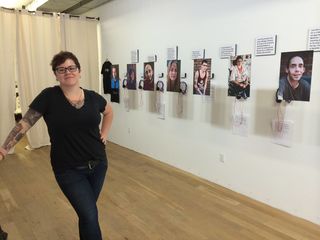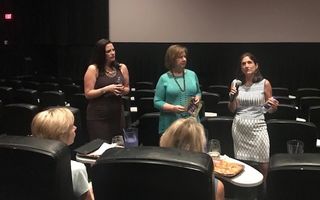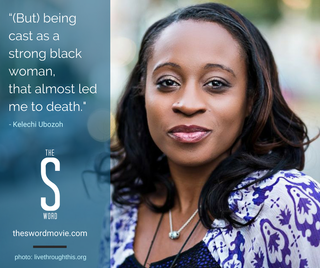Suicide
Can I Help Someone Who is Suicidal?
The "S" Word sparks tough questions.
Posted September 23, 2018
“What can I do for my friend who is suicidal?”
This may not be the exact question our panel was asked after watching The “S” Word, but pretty darn close. The “S” Word, Directed by Lisa Klein, tracks the lives of numerous people who have attempted suicide, including photographer Dese’Rae Stage, creator of Live through This.

I attempted suicide 17 years ago. Watching this film, I felt a strange reunion with people I’d never met. Bits of their stories felt identical to mine.
Many of the people in the film attempted suicide, but lived through it. Like me, they've become advocates for mental health, baring souls and dark moments with the hope it might ease the pain of others. In September (national suicide prevention month), we repeat our stories. The same question consistently surfaces: what can I do for someone who is suicidal?

Suicidologist and psychologist “Doc” April C. Foreman (in the film and on the panel with Vanita Halliburton, founder of the Grant Halliburton Foundation, and me) lamented the lack of research about the causes of suicide, but emphasized that from research we clearly know two things that prevent suicide: 1) connectedness to others and 2) lack of means.
Connectedness is whether a person feels attached to someone or something. That connection inspires life. In my book, Struck by Living, I described this attachment as threads of connection.
Sometimes the weirdest things keep people alive. Back in my suicidal summer of 2001, I didn’t want to kill myself when my sister Jean was visiting me in Santa Fe because I knew she loved Santa Fe and I didn’t want to ruin that experience for her. How convoluted was that? I didn't worry that my death might devastate my sister and my family, but let’s not pollute that impression of Santa Fe! Someone in a suicidal frame of mind is not thinking logically. The mind of a suicidal person develops its own logic, warped, but certain.
The deeper the connections, the harder it is for a person to disconnect. Sometimes that connection can be with a pet, even when connections with people falter.
In The “S” Word, a military vet made it through his darkest period of his depression because of his dog, Sargent Grunt. He did not credit the dog with his survival, but as we watched him tenderly rub Grunt’s tummy and feed him an ice cream cone, we all assigned Sargent Grunt full credit for his master's survival.
“Access to means” just means get the easy tools for suicide out of the house. The more difficult it is for someone to die by suicide, the less likely it is to happen. Firearms or excess medication left unprotected in a home provide an easy means for death. The more space one can create between the thought of suicide and the action of suicide, the less likely it is to happen. I wrote a Psychology Today article, Can an Obstacle Prevent Suicide? years ago. The answer to this question remains the same and simple. Yes.
Although research is in its early stages, I do believe the best obstacle to suicide is early intervention and good treatment for mental health care. Our family foundation has invested in a longitudinal study for the Center for Depression Research and Clinical Care at UT Southwestern. If we have the equivalent of a mammogram for mental health, we can identify and treat problems when they are small and manageable, long before suicide is an option.
The data is accumulating. With 40,000 patients screened and now 26 high schools participating, this study may shape mental health care in the future.
Seventeen years ago, my life was saved by luck and a well-ventilated garage. Luck is a flimsy mental health strategy. I've invested time and money in improving tools for physicians so that caring for mental illness can be based less on luck, and more on providing the right treatment for the right person. These efforts may take years to show results, but they are critical investments.

In the meantime, human contact is the most powerful antidote to the suicidal urge. Like the people in The "S" Word, I've shared my story in the hopes that someone else might gain that nugget of inspiration to keep living. Those who are suicidal need to know that they are not alone.
What would I say to someone who is suicidal? I'd let the person know that at one point I felt hopeless too and share this story.
As I sat in the garage in Sept of 2001, my crystal ball looked bleak. It told me my family and friends would be better off without me. But that ball was wrong, dead wrong. My kids were 5 and 7 back then. Imagine their lives with a single parent. Luckily, I stuck around long enough to experience a future far brighter than I could have ever imagined. My life has included travel, adventure, marathons, lots of theater, laughter, but most importantly my husband and I have watched our daughter and son grow into people we admire, now 22 and 24.
My crystal ball failed to convey that most important message. Maybe, just maybe your friend’s future holds something no one can imagine. But here's the catch. Your friend can only know the future if that future is lived.
Human connection is a potent elixir. Take a walk with your friend, give a hug, send a card or a silly text. One friend of mine kept me alive by painting a rock (which now is the cover of my book). The threads of connection gain resilience with the smallest of human acts.

For more information about Julie K Hersh or her book Struck by Living (available in Spanish as Decidí Vivir) check out the Struck by Living website.
Thank you to the VA North Texas Health Care System for sponsoring this screening of The S Word in Dallas. Find future screenings at DocumentaryEvents.com




